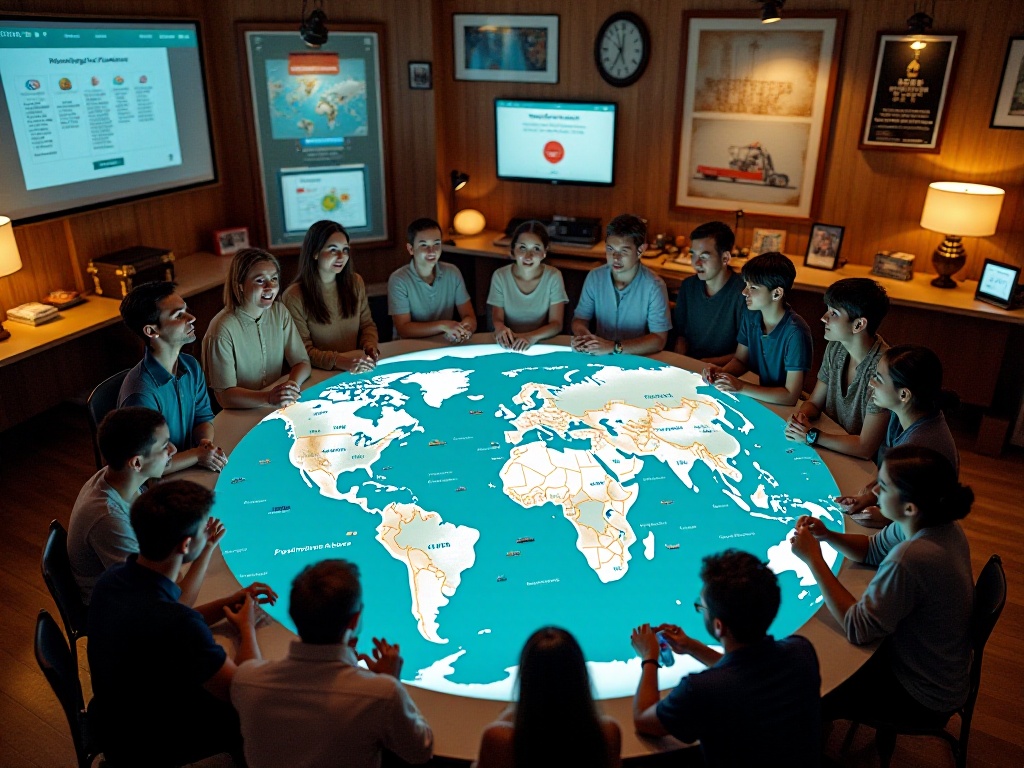Opening Words
As a travel enthusiast who has explored many places for over 10 years, I've certainly made my share of mistakes. I still remember my first solo international trip when I had to count every penny due to poor budgeting. After years of experience, I can now plan each journey with confidence. Looking at the comments section, many readers ask about travel budgeting, such as "Why do I always overspend on my trips?" and "How can I avoid spending all my money on accommodation?" Today, I'll share all my accumulated experience with you without reservation.
Two Budgeting Methods
To be honest, when I first started travel budgeting, I was completely lost. After years of exploration, I found two most practical budgeting methods.
The first is the "Fixed Budget Method." This method is particularly suitable for salaried workers like us, with fixed monthly income and expenses. For example, if you can set aside 2,000 yuan for travel this month, you need to carefully plan how to spend it. I have a friend who excels at this method - she first determines the budget ceiling, then chooses the most cost-effective destinations and activities within this budget. Last year, she had an amazing weekend in Zhejiang with 2,000 yuan, staying in an ancient town guesthouse, visiting the most characteristic local attractions, and trying all the local snacks.
The second method is the "Cost Estimation Method," which I use most frequently now. While this method requires more preparation work upfront, it can enhance your travel experience. How does it work? First, determine where you want to go. For example, if you want to visit Yunnan, research which places are worth visiting, how many days you plan to stay, and how you want to explore. Then estimate various expenses based on this information. I think this method is particularly suitable for those who have higher requirements for travel quality, as you can adjust the budget according to actual situations rather than being restricted by a fixed budget.
For example, last year I used the cost estimation method to plan a two-week trip to the Kansai region of Japan. I first listed the cities I wanted to visit: Osaka, Kyoto, and Nara. Then based on the distribution of attractions and characteristics of each city, I arranged the stay duration: 5 days in Osaka, 7 days in Kyoto, and 2 days in Nara. Then I started detailing the budget for each city, including accommodation, transportation, dining, and shopping. The final total budget was 15,000 yuan. Although it seemed like a lot, the entire journey went very smoothly because of detailed planning, with neither overspending nor regrets.

Major Expenses
When it comes to major travel expenses, the biggest expenditures are mainly concentrated on transportation and accommodation.
Let's start with transportation costs. I remember when I first went to Europe, the airfare alone cost 4,800, accounting for one-third of the total budget. This made me realize the importance of reasonable transportation planning. Later, I summarized several money-saving tips: First is choosing the right departure airport. Many people may habitually choose major airports in first-tier cities, but airports in second-tier cities often have more favorable prices. For example, when I went to Japan last summer, choosing to enter through Nagoya instead of Tokyo saved me 800 yuan on airfare.
Second is choosing suitable airlines. Although budget airlines have simpler service, they're completely acceptable for 3-4 hour short-haul flights. I often fly with AirAsia, Jetstar, and other low-cost carriers, which indeed saves quite a bit of money. However, note that budget airlines generally have smaller baggage allowances and require additional fees for checked luggage, which should be calculated into the budget in advance.
There's also choosing the right travel time. During peak seasons like summer and winter holidays and Golden Week, airfare often doubles. If you have flexible time, I recommend traveling during off-peak seasons. I usually choose to travel during low or shoulder seasons when not only are flights cheaper, but destinations are also less crowded. For instance, I chose to go to Japan in late October last year, when I could see the autumn leaves and the airfare was nearly half the price compared to the National Day period.
Accommodation is another major expense. There are so many accommodation options nowadays, from youth hostels at just over 100 per night to luxury hotels at thousands, with price differences of up to tenfold or more. My suggestion is to flexibly choose accommodation standards based on different cities and different stages of the journey. For example, in big cities, accommodations in convenient locations tend to be more expensive, so you can choose to stay in residential areas along subway lines, which are much cheaper. In small cities or rural areas, you can choose characteristic guesthouses, which both allow you to experience local life and are cheaper than chain hotels.
One money-saving tip I particularly recommend is: if staying in the same city for a longer period, choose apartment-style accommodation with a kitchen. Although the unit price might be slightly higher than regular hotels, cooking for yourself is more economical in the long run. When I stayed in Kyoto for a week last year, I rented a small apartment and prepared my own breakfast and some dinners, saving quite a bit on food expenses.
Another important consideration is the travel rhythm. If the itinerary is relatively tight, staying only a day or two in each place, simpler accommodation is fine. But if you're staying somewhere longer or need to rest, it's recommended to choose better accommodation. When I stayed in Osaka for 5 days last year, I deliberately chose a well-equipped business hotel. Although it cost 200 more per night, the bed was comfortable and there was a self-service laundry, allowing me to rest well and recharge.
Regarding accommodation choice, I want to especially emphasize one point: location is more important than facilities. A conveniently located place can help you save lots of time and transportation costs. When planning accommodation, I pay special attention to these points: proximity to subway stations or transit hubs, availability of convenience stores and restaurants nearby, convenience of transportation to main attractions, and safety of the surrounding environment. Sometimes spending a bit more to stay in the city center is more economical than staying in the suburbs and spending time and fare money commuting back and forth every day.

Hidden Expenses
After discussing major expenses, let's talk about those easily overlooked small expenses. Although these expenses are small individually, they add up to a significant amount.
First are the preliminary expenses for international travel. Visa fees are inevitable, varying greatly between countries, from hundreds to thousands. Besides basic visa fees, you need to consider costs for visa photos, document translation and notarization. Then there's insurance cost, which absolutely cannot be skipped because medical expenses abroad are really expensive. I usually choose comprehensive insurance covering medical, accident, and luggage loss protection, costing between 200-500 yuan depending on travel duration.
Local transportation costs are also easily underestimated. Although many people buy long-distance transportation tickets in advance, local subway, bus, and taxi fares add up significantly. In Tokyo, subway fares alone cost over 200 yen per day. So now I research local transportation card types in advance to see whether buying single tickets or getting a transportation card is more economical.
Dining expenses are another item prone to overspending. Price levels and dining habits vary by location. For example, in Japan, a regular bowl of ramen costs 700-1000 yen, and trying local specialty cuisine can easily cost 2000-3000 yen. So now I research local dining cost levels in advance and plan daily dining budgets reasonably. I usually plan like this: keep breakfast simple, perhaps at a convenience store; lunch is the most important meal of the day, choosing local specialty restaurants; dinner is flexible depending on the day's situation - eating simply when tired, trying popular restaurants when energetic.
There's also the easily overlooked tipping culture. In some countries, tipping is necessary social etiquette. For example, in the United States, restaurants require 15%-20% tips, hotel porters get 1-2 USD per bag, and housekeeping gets 2-5 USD per day. In Thailand, massage tips are 20-50 baht. These tips add up to a considerable expense.
Shopping is another expense that can easily get out of control. Each place has its specialties and souvenirs, and with the temptation of duty-free shops, it's easy to exceed the budget. My suggestion is to make a shopping list before departure, including what to buy and approximate budgets, to avoid impulse purchases. For expensive items like cosmetics and electronic products, it's advisable to compare prices online in advance to see if it's really worth buying abroad.
Attraction admission fees are not to be underestimated either. Although single tickets might only cost a few dozen yuan, it adds up to a considerable amount over several days. So I check in advance whether there are discounted package tickets or passes, like the JR Pass in Japan or museum passes in Europe, which can help save quite a bit of money.
Finally, consider some emergency expenses. I usually reserve 10%-15% of the total budget as a contingency fund. Because unexpected situations always arise during travel, such as needing to change flight tickets due to itinerary changes, seeing a doctor when sick, or wanting to purchase particularly appealing items. Having this contingency fund prevents being at a loss when unexpected situations occur.

Practical Guide
After discussing so much theory, let's talk about how to actually implement it. I'll share a practical budget planning process.
The first step is thorough research. Information online is very rich now, and you must make good use of these resources. I usually first understand the destination's basic situation through various travel forums and blogs, including best travel times, key attractions, transportation methods, etc. Then comes price research - I compare airfare prices on different booking platforms, usually starting to monitor 3-6 months in advance. When booking flights, pay attention to whether baggage allowance is included, as some budget airlines have expensive overweight fees. For accommodation, I also compare multiple options, checking not only common booking websites but also local accommodation platforms, sometimes finding better prices.
The second step is making a detailed itinerary. This step is very important for budgeting because itinerary arrangements directly affect various expenses. I break down the entire journey by day, including places to visit, transportation methods, and dining arrangements. When making the itinerary, pay attention to reasonable arrangement of schedule density - neither too packed causing fatigue, nor too loose wasting time. Also consider distances between attractions, planning reasonably according to geographical location to save much transportation time and cost.
The third step is detailed budgeting. I divide the budget into several categories: transportation, accommodation, dining, admission tickets, shopping, miscellaneous expenses, etc. Then based on previous research results, estimate a specific amount for each item. Note to leave some margin here, as actual expenses are often slightly higher than expected. I usually add 10% to estimates as a safety factor.
The fourth step is executing the savings plan. With the total budget, work backward from departure time to make a reasonable savings plan. For example, planning a 20,000 yuan trip in six months means needing to save 3,333 yuan monthly. I suggest keeping travel funds separate from daily expenses, perhaps opening a special savings jar or investment account. This not only clearly shows savings progress but also prevents using travel funds for other purposes.
The fifth step is booking and payment. After saving enough budget, start gradually booking flights, accommodation, etc. I suggest first booking items with relatively fixed prices and strict cancellation conditions, like international flights. Then accommodation - many hotels support free cancellation, so book first and adjust later according to circumstances. Finally, attraction tickets and other items can be arranged flexibly according to actual situations.
The sixth step is preparing emergency funds. Besides normal budget, must prepare some emergency funds. I usually prepare a credit card and certain amount of cash as backup. When traveling abroad, best to carry two credit cards from different issuers in case one has problems. Cash should include two currencies - one internationally accepted like USD, one local currency of the destination.

Final Words
Through years of travel experience, I deeply feel that travel budget is not a restriction, but a tool to make our travels more comfortable. Reasonable budgeting can reduce anxiety and increase enjoyment during travel. Remember, the key to budgeting isn't saving money, but making every penny worth spending.
Here, I particularly want to emphasize that travel budgets should be made according to personal circumstances. Some people like to be frugal, staying in hostels and eating street food; others enjoy high-quality accommodation and cuisine. Neither is right or wrong - the key is finding what suits you. Don't sacrifice experience to save money, nor exceed your capacity for face.
Most importantly, learn to maintain an open and flexible mindset while traveling. Sometimes plans can't keep up with changes - it's completely fine to adjust the budget when encountering special experiences or unexpected situations. After all, the meaning of travel isn't just about checking off attractions, but about those unexpected surprises and touching moments.
Over these years, I've seen many people give up their travel dreams due to budget issues, which is unnecessary. With good planning, anyone can afford a spontaneous trip. I hope this article gives you some inspiration, and I look forward to hearing your travel stories and budgeting insights.




